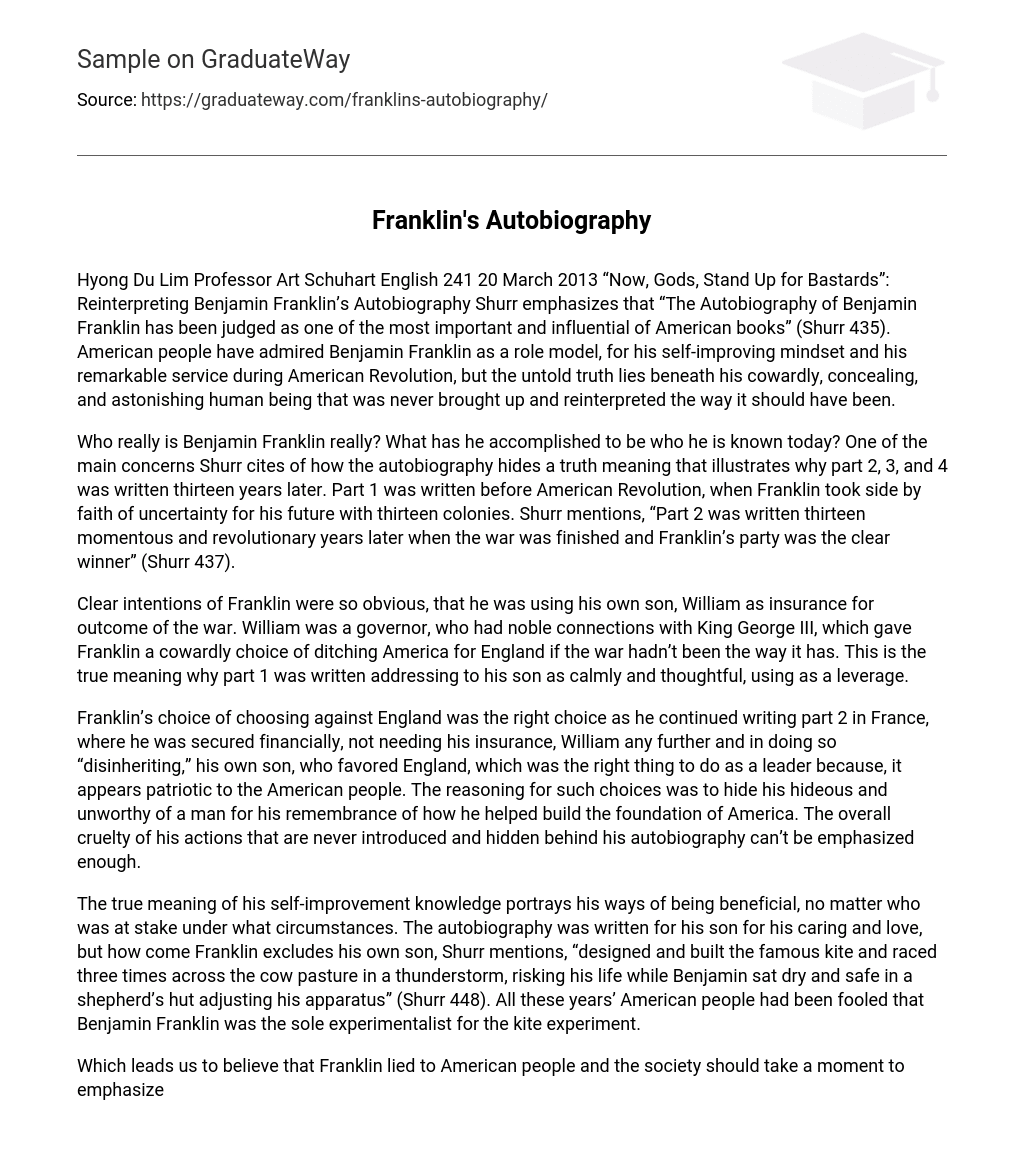Shurr (435) states that Benjamin Franklin’s Autobiography is highly regarded as a significant and influential book in American literature. Despite the admiration Americans have had for Franklin’s self-improvement philosophy and his contributions during the American Revolution, there remains an unacknowledged truth about his character that requires proper acknowledgment and reassessment.
Benjamin Franklin is a figure who is widely recognized and celebrated. He has achieved great things that have contributed to his reputation. In the autobiography, there is a concern raised by Shurr regarding the hidden truth, which explains why parts 2, 3, and 4 were written thirteen years after the initial part 1. Part 1 was written prior to the American Revolution, when Franklin had uncertain faith in the future of the thirteen colonies. According to Shurr, “Part 2 was written thirteen years later, at a significant and revolutionary moment when the war had ended and Franklin’s party emerged as the clear victor” (Shurr 437).
Franklin’s intentions were clear: he was using his own son, William, as insurance for the outcome of the war. As a governor with noble connections to King George III, William provided Franklin with a cowardly option to abandon America for England if the war did not go in their favor. This is the true reason why he wrote part 1 addressing his son calmly and thoughtfully, using it as leverage.
Franklin made the correct decision to reject England and instead continue writing part 2 in France. In France, he found financial security and no longer needed the support of his insurance, William. By making this decision, he effectively “disinherited” his own son who was supportive of England. This was a wise move as a leader because it demonstrated patriotism to the American people. Franklin’s reasoning for making these choices was to conceal his deplorable actions and unworthy character, which contradicted his role in building the foundation of America. The extent of his cruelty, which is never explicitly acknowledged but disguised within his autobiography, should not be underestimated.
The true significance of Benjamin Franklin’s knowledge and efforts to improve himself demonstrates its universal benefits, regardless of who was affected or the circumstances involved. Although Franklin wrote his autobiography for his son out of care and affection, there is irony in the fact that he excludes his own son from some of his risky experiments. As Shurr points out, Franklin “designed and built the famous kite and raced three times across the cow pasture in a thunderstorm, risking his life while Benjamin [his son] sat dry and safe in a shepherd’s hut adjusting his apparatus” (Shurr 448). For years, the American people were misled into thinking that Benjamin Franklin was the sole experimenter in the kite experiment.
It is suggested that Franklin deceived the American public, prompting society to consider which narrative is truly accurate. Benjamin Franklin, one of the founding fathers, dedicated his time to establishing our nation’s framework. How can one speak ill of such a revered figure in our history? If you ask any American about Benjamin Franklin, they will respond with deep admiration and patriotic reverence for his significant impact, particularly during the American Revolution.
Franklin’s self-teaching methods were praised by an educational site as brilliant and vital to the establishment of the American republic. While serving as the American representative in London, he skillfully persuaded Parliament to repeal the despised Stamp Act taxes, giving America a decade more to get ready for armed conflict against Britain (Powell). It is astonishing how Franklin excelled in various fields such as invention, music, science, and politics, all while effectively advocating for the unity of the thirteen colonies to ensure victory in the Revolution.
Benjamin Franklin, a highly intelligent and patriotic person, dedicated himself to enhancing his country through political efforts. As a result of his diligence, America has become a significant economic power. I agree with this viewpoint as I do not see Franklin as the coward portrayed by Shurr. According to Shurr’s claims (Shurr 447), Franklin is accused of intentionally allowing his son Williams to endure torture for two hundred and fifty-two days in a rebel prison.
It is highly improbable that a man with such credentials would engage in inhuman actions. Furthermore, there is no relevance to his mindset of comparing others’ reasoning with his own in order to achieve the best possible outcome. His numerous contributions to society, inventions, scientific logics, and critical role in persuading France to support the Revolution by providing supplies to the colonies are undeniable. According to renowned television company PBS, Franklin is still held in high regard by the French, with many believing he was the president of the United States.
They say, ‘he was the best president you ever had! ‘” (PBS). It is difficult to imagine Franklin as Shurr describes him. Benjamin Franklin can be seen as a coward who used his own son as leverage during the Revolutionary War. The book, “Now, Gods, Stand Up for Bastards”: Reinterpreting Benjamin Franklin’s Autobiography, may lead some readers to doubt Franklin’s motivations and question his morals and reasoning based on various instances and circumstances that depict wrongdoing.
There is no doubt about Benjamin Franklin’s credibility, as his significant achievements are recognized for their actual outcomes rather than any concealed events. Despite his failures, the immense value of his successes has already been verified and overshadowed them. An example of this is Franklin’s belief in the importance of a prosperous middle class for American progress. He stated, “[Franklin] believed that in order to have a functional democracy there has to be a strong and well-educated middle class” (Potanin).
The significance of Benjamin Franklin’s presence on U.S. one hundred dollar bills cannot be overlooked in the past decade. This recognition is based on his significant contributions to America’s establishment. Despite any negative personal qualities attributed to him, such as cowardice or ugliness, American society values only what can be proven, ethical, and reasonable when evaluating his historical influence.





